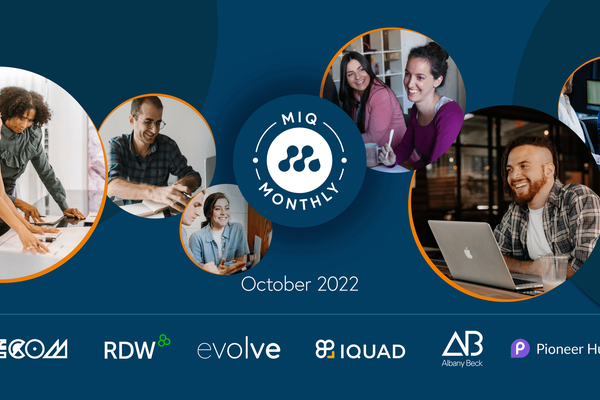MIQ Debrief with Greg Coleshill - October 2022
Pubished 24th October 2022
In this video, Managing Director Greg Coleshill shares the latest market trends for October 2022.
Video Transcription
Let’s take some time to look at this month’s Market Intelligence document and pull out some of the key points.
Before we get started, if you find today’s video interesting and want a copy of the report, or to discuss further, please drop me a note at greg.coleshill@interquestgroup.com and I’ll happily share a copy.
Initially, despite a drop in hiring and investment decisions, we can see that permanent recruitment intentions remain very buoyant and non-permanent demand spikes significantly. Personally, I see this as a really interesting point as, typically, when markets begin to shift non-permanent workers are the first to be hit.
I think this unique scenario is a result of what has been an extremely buoyant market over the last few years where we have seen demand materially outstrip supply for an extended period. This means that, although there is concern about macro conditions, companies still need to hire to deliver essential programmes and understand the only way to do this is through a blend of permanent and non-permanent workers.
The level of challenge in the market is illustrated by the continuing historic low ratio of unemployed people to vacancies remaining at 1:1.
Permanent hiring remains both buoyant and challenging. Based on a survey by Talos360 candidates polled illustrated that the main priority when considering a new role was a Better Salary. Flexible hours and flexibility remain high on the list however, considering the ongoing cost of living crisis and current macro challenges, it is unsurprising that pay and remuneration are at the top of the list.
Job postings in the UK remain extremely strong at in excess of 43% over a pre-pandemic baseline illustrating companies will face a continued challenge in hiring top talent. To combat this, clients must look closely at their hiring processes in order to secure the best talent. Almost every candidate will have 3 or 4 opportunities at the same time. Speed and quality, of process is a key differentiator. The Talos360 survey referenced earlier also illustrated that 69% of candidates will lose interest after 1 week without a response and a staggering 98% will have lost interest after 2 weeks!
I’m going to take a quick moment to give you a little information about InterQuest and who I am.
My name is Greg Coleshill and I’m the Managing Director of InterQuest’s Risk, Regulation, and Compliance function. InterQuest is a specialist search and consultancy firm. We provide specialist talent solutions to financial services and technology companies. Our services include retained and senior search, specialist recruitment, and non-recruitment talent solutions including our highly-effective recruit, train and deploy services via our IQUAD brand.
Looking specifically at financial services and banking, many will be concerned that we are clearly heading into a recession and are, understandably, worried about what this will mean for the sector. Personally, I don’t think this will be the same as 2008 from a jobs market perspective. We’ve seen the market remain remarkably robust throughout covid and I think this will continue to a large extent despite the macro challenges. Due to the proliferation of fintechs and payments firms, in comparison to the financial services market in 2008, there is a significantly greater and diversified demand for talent. Coupled with ongoing digital and regulatory transformations within the large incumbent banks I believe this will ensure demand for talent, especially the top 5%, remains very high.
This is illustrated by data from financialreporter.co.uk which surveyed UK finance leaders and found that 57% were worried about a lack of new hires. Additionally, 40% cited their biggest concern as “finding people with the necessary skills”.
Additionally, a recent survey by Multiverse illustrated the scale of the skills gap in financial services and, perhaps more importantly, the impact of this on current employees. A few key stats were:
64% felt that colleagues without advanced digital and data skills were at risk of future redundancy
- 83% felt roles would be impacted by digital transformation
- 47% felt that new technologies were causing skills gaps
- Additionally, the results from senior leaders surveyed illustrated some stark facts
- 94% felt the skills gap was having a negative impact on retention
- 93% felt there was a negative impact on current employee productivity
- And 59% cited they were continuing to struggle to address diversity issues
These statistics are, from my perspective, quite stark. When you also consider the ongoing talent shortages within data, digital, technology and other specialist areas it is clear that organisations need to have a clear strategy that will incorporate a short-term solution to deliver business goals but makes clear steps towards solving their longer-term talent challenges.
We’re currently speaking to a significant number of clients about how our recruit, train and deploy model can solve this exact challenge. We hire high-quality diverse talent, provide bespoke and specialist training, and deploy them with our clients. Throughout the process, we provide ongoing training and support to ensure they are happy and engaged. At the end of the agreed period, they then join our clients as permanent members of staff providing a sustainable solution to their talent challenges.
Hopefully, you have found my points interesting. If you’d like the full report or would like to discuss any of the topics in more detail please get in touch!
Thanks


